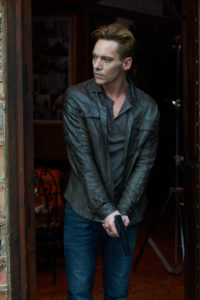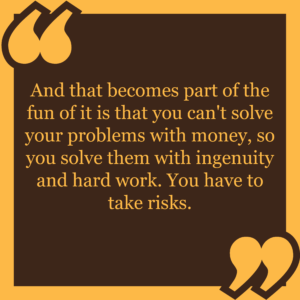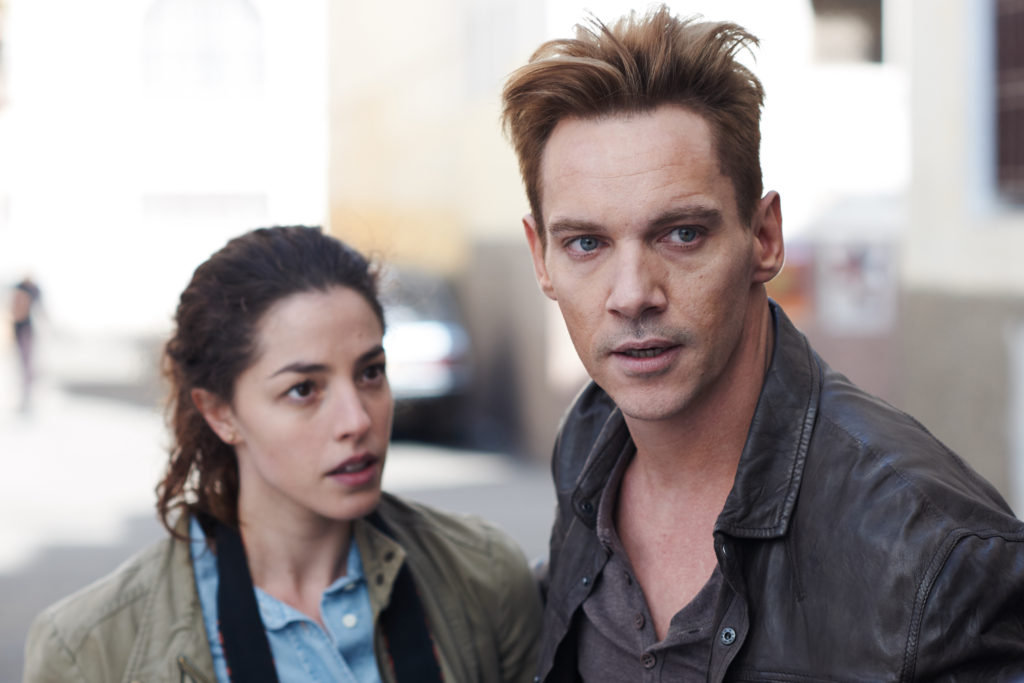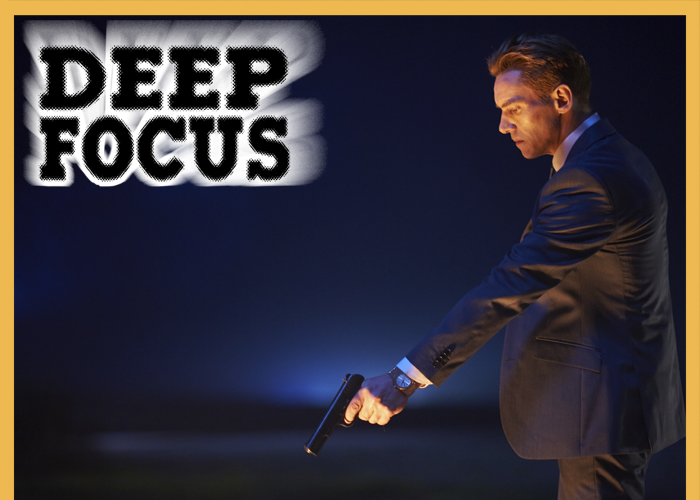
In our ongoing column Deep Focus, TrunkSpace is going behind the camera to talk with the directors, writers and producers who infuse our world with that perennial pop culture goodness that we can’t get enough of.
This time out we’re chatting with Daniel Zelik Berk, the director and writer of the new spy thriller “Damascus Cover” (starring Jonathan Rhys Meyers, Olivia Thirlby, and the late John Hurt) about how the movie-making process differed from his previous directing work, why he broke all of the conventional rules in creating the movie, and the reason you may be familiar with some of the furniture in the film.
TrunkSpace: You didn’t only direct “Damascus Cover” but you wrote it as well. Did director Dan and writer Dan ever butt heads, and did you have to compromise creatively even with yourself at times?
Daniel Zelik Berk: Oh, good question. Okay. The genesis of this is that I purchased a book. I optioned a book called “The Damascus Cover” by Howard Kaplan, which was a spy thriller set in the late ’70s. I was looking for something to direct. I’d done one film before as a director, and that was an assignment. It was a low-budget film, which was made for under a million bucks. What I learned on that picture was how important the script was, because I wasn’t able to change the script on my first film. So I said that I needed to really find something that was personal and something that I wrote myself.
I found Howard’s book, which I liked very much because I liked that it was in the Middle East. I liked that it had an ending, which was very organic and wasn’t kind of a trick ending, which is pretty typical of the genre where you work really hard to get through a film and it’s very confusing. You get to the end, and you’re like, “Who’s the mole?” It’s like the guy in the blue shirt. You’re like, “What? Who’s that?” You don’t even know who that is. This ending has a very nice, organic ending. You find out who it is. Usually it’s a surprise, and it seems in retrospect that it was an inevitable kind of thing. I like that, so that’s why I got this.
Then, I added some themes that I liked about children and hope and moved it to the time of the Berlin Wall to reflect that. As the writer, I really enjoyed doing the adaptation. What I liked about Howard was he recognized the script would be something completely different. In fact, in the process that you make various movies, there’s the novel, which is one thing. There’s the script, which is one thing. Then ultimately, you have to deal with the reality of who the cast is and where the locations are, and that becomes the movie you shoot. Then, you go to the editing room, and that’s another whole movie because now you’re working with what you actually got. Each one of these things at each level is a different process, which is part of the fun of it. I guess you try and stay as open as you can in each section, realizing you don’t want to be limited by your imagination and what the change is.
really enjoyed doing the adaptation. What I liked about Howard was he recognized the script would be something completely different. In fact, in the process that you make various movies, there’s the novel, which is one thing. There’s the script, which is one thing. Then ultimately, you have to deal with the reality of who the cast is and where the locations are, and that becomes the movie you shoot. Then, you go to the editing room, and that’s another whole movie because now you’re working with what you actually got. Each one of these things at each level is a different process, which is part of the fun of it. I guess you try and stay as open as you can in each section, realizing you don’t want to be limited by your imagination and what the change is.
As the director… the thing about this is is that because I was also the writer, I didn’t… this is a very interesting film. I wanted to do what basically is a classic spy thriller, almost from the ’60s. Unfortunately, we keep getting compared to James Bond, which is really… we can’t even attempt that. We had basically a few million dollars to do this, and by writing the script… obviously, it breaks all the rules.
TrunkSpace: Well, certainly, you get to a point where you can create your vision on the page, but then budget and time constraints change that vision.
Daniel Zelik Berk: Yeah, that’s right. The thing about this script, which was insane, which actually comes from the book, is that when you do a low-budget film, there are certain rules. There are certain things you just know that are conventional wisdom, and one is is that you do a limited number of locations, preferably one location. Like, you want to do it in house, and some people are trying to break in. Or, you’re in a car, and a guy’s talking on a speaker phone. We have, I forget the number of locations, but it’s like 40 or 50 locations. You can see it’s cutting all over the place. So, that’s rule number one you’ve broken. Then, the other rule is you have a limited number of people. There are two people in the house, and there’s one guy trying to break in, or, one guy sitting in the car on the speaker phone. We have a huge cast, so I kind of created my own nightmare here by writer Dan and director Dan. Those are some basic rules I broke, which is why you don’t see a lot of low-budget thrillers of this kind – spy thrillers. What you see are low-budget horror films, and low-budget films where it’s a guy in a room, and he’s talking to his mother about wanting to kill himself or something. That’s what a low-budget film is. They’re more like plays. So, that created a lot of problems for me.
TrunkSpace: Well, and a lot of times, you hear people refer to something as a low-budget film, but really it’s still a 20 million dollar movie.
Daniel Zelik Berk: You know, that’s a really funny comment because my daughter heard a lecture from a filmmaker that I won’t mention, complaining that they only had 20 million bucks. They were really pissed off because they wanted 50. My daughter’s like, “My dad, he only had a few million.” (Laughter)
I’ll tell you something, the truth is is that… and I understand this and I’m not complaining… the standard of the public is the same. I don’t think they know the difference.

TrunkSpace: That’s true.
Daniel Zelik Berk: I’m very proud of the look of the picture. I hired a first-time DP named Chloë Thomson, a female DP who had never done a feature before. We wanted to do this kind of classic look, and I think she completely accomplished it. I think that the picture looks really good, and that creates this expectation of it being a studio picture. I mean, the fact that she performed a miracle… it’s almost like somebody should make it look rougher, then you could kind of introduce a lower expectation. But I understand. We’re trying to run with the big boys even though we have much, much less money.
TrunkSpace: From a personal satisfaction standpoint, to be able to pull off what you did for only a couple million dollars… that has to be a feather in your cap?
Daniel Zelik Berk: Yeah. I’m telling you, I am extremely proud of what we pulled off. I couldn’t be more proud of everyone that worked on the film because people did it as a labor of love. I just was on a call where a guy said, “What would you have spent more money on?” I was like, “First day, what I would have done is given everyone better food.” (Laughter) Soup gets boring after a while, right?
Everything is on the screen, I can tell you that. And that becomes part of the fun of it is that you can’t solve your problems with money, so you solve them with ingenuity and hard work. You have to take risks.
TrunkSpace: We have had conversations with filmmakers who have said that having more money meant more problems for their production. You start to think bigger, outside your means, and you have more cooks in the kitchen.
Daniel Zelik Berk: Well, that was not an option for us. (Laughter) That was never an option. Literally there was a scene where we didn’t have money for the furniture for the next scene. The line producer said, “Look, we’re sitting at the Sheridan.” He says, “Do you like that furniture you’re sitting on?” And I said, “Yeah, I guess so.” Next thing you know, we carried that furniture over to the set and then brought it back the next day – literally just used the furniture of the hotel. In retrospect, that story’s fun. (Laughter)
TrunkSpace: You mentioned how your first directorial project, which was back in 1998, was an assignment. Did the process of directing feel new again, or, was it a bit like riding a bike?
Daniel Zelik Berk: The thing that I had on the second film that I didn’t have on the first film, and this is related to your first question, is I really understood the script. One of the things I think a director does is he has the big picture. Everyone’s trying to help you. You have all these people trying to help you. There are people all over the place in different positions with different things and different focuses, but the director is the only one that really has the grand view in line. Even with the actors. The actors know their individual parts. It’s all compartmentalized. The only one that really has the biggest picture is the director, and by writing the script… it’s a complicated script… that was actually an advantage from the first time in that I really knew this character should be scared here because of what’s happened four scenes before, and people might forget that, but this happened. You really do have this kind of overview. Because when you shoot an individual shot, you’re very focused on just that shot.
Every film is different, every film is a miracle, and every film has massive problems, but they’re always different. So, I had different problems on this movie than I had on my first film. I felt good. I still remembered basically how to say, “Action,” and all that kind of stuff wasn’t as dramatic. I learned a ton on this, too. My first film was much simpler. Even though I had never directed before, and it was a big learning curve, it was much simpler. This film was very, very complex.
Dive into the complex storytelling of “Damascus Cover” today!


